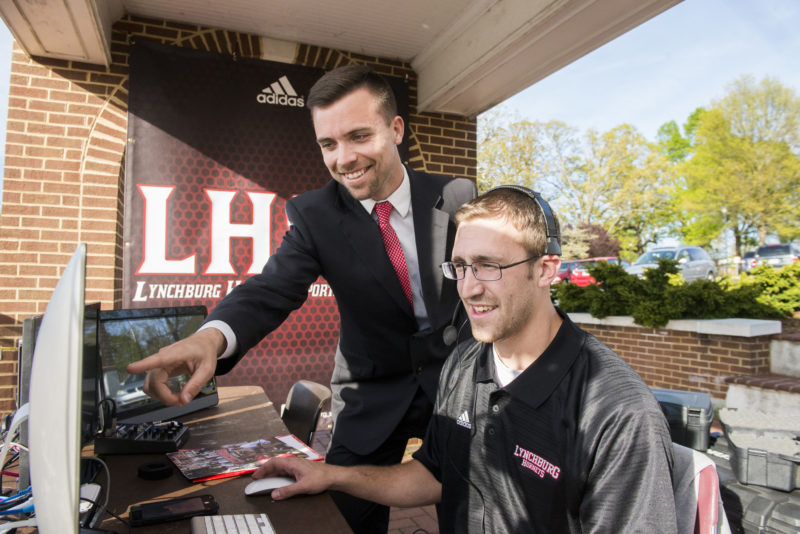Students at the University of Lynchburg can soon minor in crisis communication and sports media. Both minors are a result of student demand and both combine courses in communication studies with other disciplines.“We received a lot of excellent feedback on our multidisciplinary minors during a recent self-study,” said Dr. Mike Robinson, who chairs the communication studies department. “These programs often emerge out of realizations we have when talking to students and other departments.”

Dr. David Richards, who chairs the political science department as well as international relations and security studies, had alerted his communication colleagues that there was a need for crisis communication. He realized this when developing the new intelligence studies major last year.
“We were looking at constructing the major to offer students real world experience and preparation for a career in the security and safety working world,” Richards said. “When thinking about students getting a job in government or the private sector in security and safety, being able to communicate to the public in times of crisis is essential.”
So Richards talked with Robinson and Dr. Jeremy Langett, who teaches public relations courses in communication studies.
“I realized that we already had several courses that would give our students these skills. So we got together to set up the crisis communication minor,” Richards said. “The idea is to offer students an introduction and some tools to use in times where security issues present crisis inflection points for government or private business.”
The various national and global crises of the last year made it obvious that crisis communication skills are in great demand and that a minor would be a valuable addition to Lynchburg’s curriculum, Robinson added.
The requirements include four mandatory communication studies classes and one course from another discipline for a total of 15 credits:
- COMM 171 Media and Culture
- COMM 201W Media Writing
- COMM 260 Introduction to Public Relations
- COMM 302 Crisis Communication
One from:
- CRIM 202 Criminal Justice Process
- HMSV 201 The Science and Art of Meeting Human Need
- INTL 280 Security Studies Theory
- POLI 303 Terrorism and Revolution
- SOCI 225 Poverty, Homelessness, and Social Justice
Like crisis communication, sports media is a minor that sets Lynchburg apart, Robinson said. “The more we talked about it, the more we realized nobody is doing it.”
The curriculum was developed in partnership with the University’s sport management program, again in response to student demand.
“We felt that a need existed for those students who were interested in either — or both — majors, but more specifically in the sport media aspects,” said Dr. Danny Hedrick, chair of the sport management department. “While both departments hit on elements of sport media, the minor allowed for a more concentrated approach as well as hands-on experience.”

A notable feature is the minor’s required internship — either with the Lynchburg Hornets Sports Network or another, similar organization. The minor was built on a 100-level class called Sports Broadcasting, with the goal of getting students involved in sports media early on in their University of Lynchburg career, Hedrick said.
In all, the minor requires 21 credit hours:
- COMM 104 Introduction to Media Technology
- COMM 201W Media Writing I
- SPMG 160 Sports Broadcasting
One from:
- COMM 180 Stage and Studio Television
- COMM 202 Multimedia News Writing and Reporting
One from:
- COMM 304 Digital Editing and Motion Graphics
- COMM 381 Convergence Media: Storytelling in an Internet World
One from:
- SPMG 275 History of Sport in America
- SPMG 300 Sport in American Society
- SPMG 350 Gender and Sport: Issues and Controversies
One from:
- COMM 399 Internship in Communication
- SPMG 415 Internship in Sport Management
Sports media is available now, and crisis communication will officially be added to the course catalog this summer. They’re joining several existing minor collaborations between communication studies and other schools in the Lynchburg College of Arts and Sciences.
There’s digital media arts, which is housed in the art department and combines media production and graphic design, as well as digital media marketing, a collaboration with the College of Business. Several years ago, communications also teamed up with sociology to create the popular culture minor.
To Robinson, who has taught at Lynchburg for more than 20 years, his department is a natural partner for a variety of programs.
“We live in a mediated world with countless messages in our daily and professional lives,” he said. “It’s great to help people get their messages out more effectively.”

